Hola and welcome to Where on Planet Earth! In case you got here by accident and are not yet a subscriber, sign up below! For more visuals on our travels follow us on IG @whereonplanetearth
“Tapar el sol con un dedo” or “to cover the sun with a finger”, is a commonly used phrase in Spanish, and it means to attempt to hide something that is too conspicuous, to pretend that something obvious is not actually there.
We spent about two weeks in Bulgaria and the country was memorable in many ways - the food has been our favorite in the Balkans, we stumbled into many enriching cultural events, the people are super kind and welcoming, and it’s naturally gifted. But, unfortunately, one of those memorable ways was the amount of swastikas graffitied on the walls of every city we visited in the country.
Why, we kept wondering, don’t they scrub them off? This is what happens in many cities around the world. A swastika will appear in the streets of a city and just as quickly be cleaned off. In many cases there will even be an investigation, as it’s considered a hate crime.
In Bulgaria? Well, the policy seems to be to ignore.
When we asked a tour guide he simply shrugged, “sure, graffitis are illegal, but no one cares too much about them”
“But… these are not just any graffitis, these are swastikas”, I answered dumbfounded
“It’s just some rebellious kids, a few hooligans, they don’t mean much by it”
Speechless, I thought but didn’t say: do you honestly think this is a meaningless symbol? are you telling me these “kids” are so dumb they don’t know what it means? what about the other symbols surrounding the swastika: the Celtic cross, the number 88 and the year 1914? These are all well-known neo-Nazi symbols.
No, it’s not meaningless, the message is clear for anyone who cares to pay attention

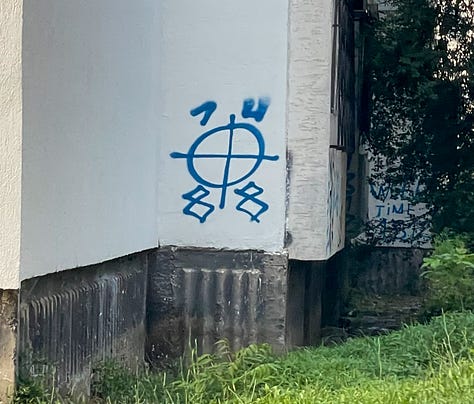
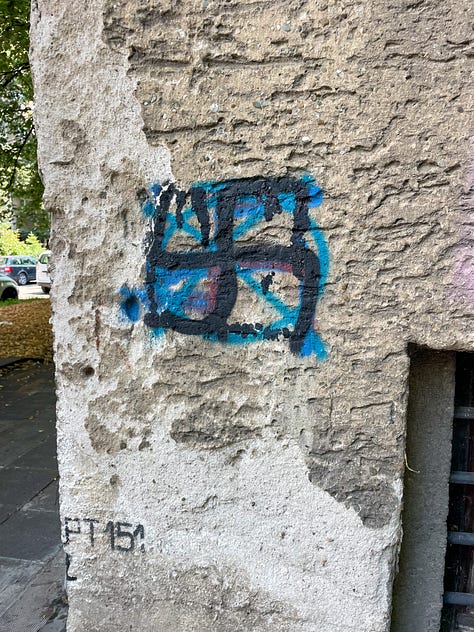
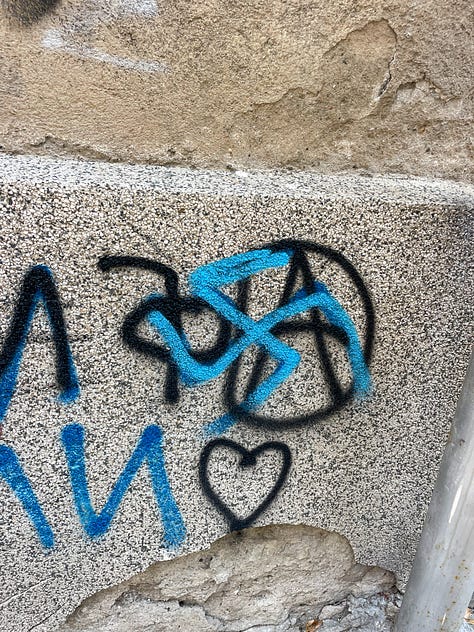


We found this blaze attitude towards their swastikas-covered cities in most conversation we had with locals. This really caught our attention and made us want to dig more, so throughout our time in the country we were very deliberate in asking and probing (and scanning every wall) to try to understand this perspective.
Just as soon as we noticed the swastikas we also noticed locals tip toeing around Bulgaria’s role during WWII. Some would talk at length about Bulgaria’s old history -which goes back 6,000 years! - but then simply skip over the war period. Nothing to see here, it felt they were saying. So of course we wanted to see.
When the topic of WWII came up, either because we directly asked about it or it was necessary context for something that was being said, it was framed as if Bulgaria was a victim, “we were forced to join the Axis powers”, “we didn’t want anything to do with the war!”, “we actually saved our Jewish population”, etc.
All of it felt a little forced, a little too convenient to be totally true.
So off we went into the internets 😉 and the story is, as expected, a lot more complicated.
A few basics to start. Bulgaria was for a very brief period neutral during the war, but soon after they joined the Axis powers, thirsty for territorial gains. Many countries joined the war for this reason: Germany promised them land. Bulgaria had actually lost a lot of it at the end of WWI, so they were eager to retake it. The Bulgarian military didn’t actively participate in some of the Nazi’s nearby invasions, but they eagerly occupied (or liberated depending on who you ask) those territories once the governments surrendered, such as in Northern Greece and Eastern Yugoslavia.
One of the reasons I love seeing a region, such as the Balkans, rather than a single country is because we get to hear many overlapping histories told in widely different ways. We arrived to Bulgaria from what is today North Macedonia, and was then part of Yugoslavia. North Macedonia was occupied by the Bulgarian military during the war, and although most of the population living there actually welcomed the Bulgarians for various reasons, it’s also a fact that the Bulgarian military deported more than 11,000 Jews - almost the entire Jewish population of the regions they occupied - to their deaths in the Treblinka concentration camp. Bulgaria even financed the deportation, an agreement that happen nowhere else.
I’d bet you will not hear this fact while traveling in Bulgaria, certainly not without a caveat regarding how they were forced to deport them. But, the one thing you will be told is that Bulgaria “saved the Jews from the Holocaust”. And it’s absolutely true that that the Jewish population living in Bulgaria at that time - not the ones living in occupied territories - were not deported. This is a source of immense national pride, as it should be. But, when you understand the full history, it kinda feels like a get-out-of-jail-free card.
So, surprise! it’s complicated. Bulgaria seems to be so many things at once, and aren’t we all?
(side note: there is a lot of contention between North Macedonia and Bulgaria regarding the events surrounding WWII and how each country portrays them today, but that is story for another day.)
Back to the present and the swastikas on walls that no one seems to pay much attention to. Although I don’t know for certain what leads to this indifference, my guess would be that it has something to do with confronting uncomfortable pieces of their past.
In one of the tours we took, our guide told us indignantly and in reference to the communism regime that took power after the war,“the communists even called our leader a fascist!”. Again, I thought but didn’t say, because he probably was, as many other European leaders during that time.

In most places around the Balkans region (Albania has been an exception), we have found the commentary towards WWII pretty muted. The topic is either entirely avoided by tour guides or simply discounted with comments that suggest there wasn’t wide support for fascism, such as “there was *a single* general that led us to war!”. This is a naive viewpoint.
It’s also obvious that the motivation for this deliberate blindspot is their communal hate for communism, and the fact that fascism and the war had a lot to do with communism raising to power. And about their hate for communism they will talk endlessly, and honestly I can’t blame them for this. I can only hope we Venezuelans can speak about our current horrific “communist” regime in the past tense someday, and I also hope we will acknowledge the valid reasons why it came to power. But, I was still shocked when one Romanian tour guide referred to their country’s late switch in WWII to join the Allies, and Russia, as “a bad decision”. Because I’d take Russia over the Nazis any day, and I know that is a lot to say today, but still.
During that tour in Bulgaria in which the swastikas were dismissed as being done by “just a few hooligans”, Alan asked if there was a far-right party and who was voting for them; “yeah, those same hooligans vote for them, and they won some seats in the last election”, the tour guide replied nonchalantly. Turns out the ultranationalist Vazrazhdane party got 14% of the vote in Bulgaria’’s most recent parliamentary election, which made it the third largest party in the parliament. These are certainly not just some powerless hooligans.
So, it feels that Bulgaria - but not only Bulgaria - is happy to block the sun with a finger and pretend that there was no fascist support then, and that there is no far-right support now.
As it often is, the lesson in this case is a sobering one. Europe’s far right is winning more and more seats and elections, from Italy to France to Sweden, and some are still naive about what this might mean.
Why don’t we just face the sun? Let it shine on your face, let it remind you there is darkness too.
Where are we now?
We just spent a few days in Brașov, a town located north of Bucharest in the historic region of Transylvania in Romania. I am completely smitten by it! The architecture, the nature surrounding it, the pastel colors, the weather (so much cooler!!), everything about it is just *chef’s kiss*. We are leaving today to what I am sure will be another very cute town, called Sighișoara, but before we head there we are driving a portion of the famous Transfăgărășan mountain road! More on that later (check IG for real time pics!). Alan’s mom left this morning to visit Alan’s brother and his family in England, so it’s back to us two for a while.


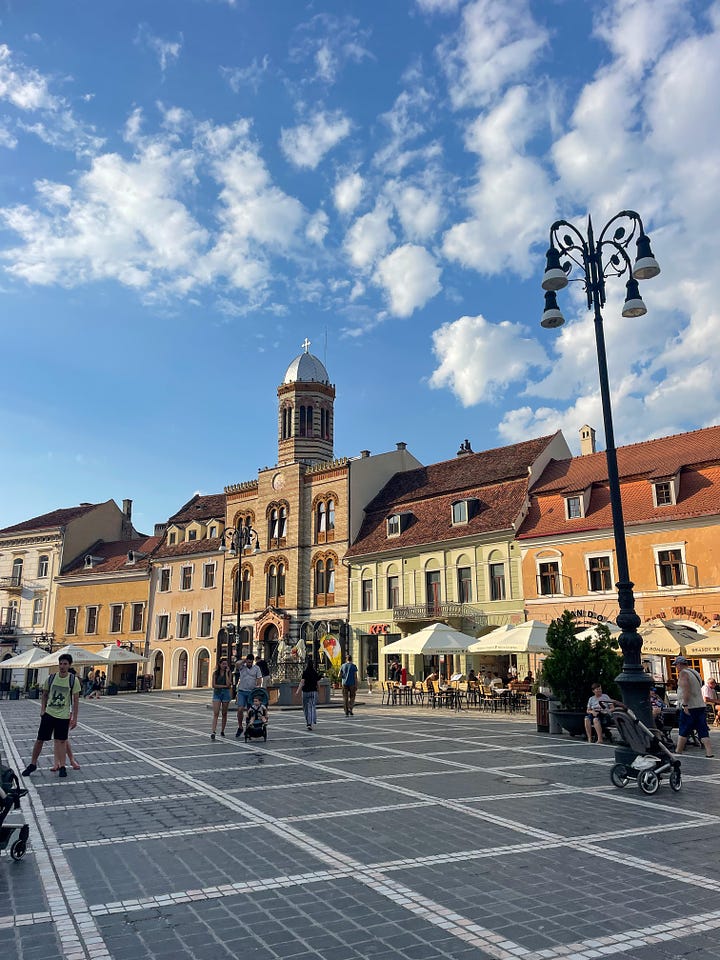


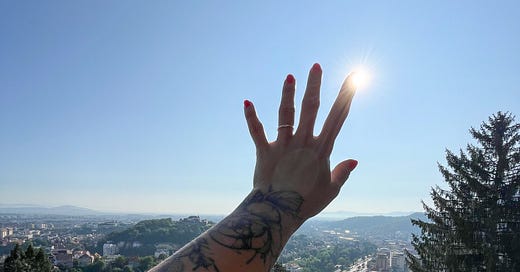



Excelentes clases , mil gracias por informarnos acerca de la historia de Romania !
Excellent article Carla. Very informative and well written. I love reading your posts. Keep it on. Thank you.